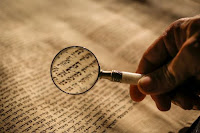Between Law and Spirit
After the Ascension, the Apostles returned to Jerusalem to await the “Promise of the Father,” the Gift of the Holy Spirit. In the meantime, they appointed Matthias to the apostolic office held previously by Judas Iscariot. As the leaders of the new covenant community, they needed twelve representatives to demonstrate continuity with the people of Yahweh. The work that Jesus “began to do” was not entirely new - It was in fulfillment of the redemptive promises of God recorded in the Hebrew Bible.
Quite likely, Luke inserted
this next story into his account to contrast the period before the outpouring
of the Spirit with all that occurred afterward.
 |
| [Photo by Mick Haupt on Unsplash] |
- (Acts 1:12-14) – “Then returned they unto Jerusalem from the mount called Olivet, which is nigh unto Jerusalem, a Sabbath day’s journey off. And when they arrived, they went up into the upper chamber, where they were abiding, both Peter and John and James and Andrew, Philip and Thomas, Bartholomew and Matthew, James the son of Alphaeus, and Simon the Zealot, and Judas the son of James. These all with one accord continued steadfastly in prayer, with the women, and Mary the mother of Jesus, and with his brethren.”
The passage confirms that Jesus
departed for heaven from the Mount of Olives. A “Sabbath day’s journey”
was the walking distance allowed under Jewish tradition on the Sabbath, a little
over one kilometer.
Whether the Ascension occurred
on the Sabbath is not the point. The passage stresses the nearness of Olivet to
the city of Jerusalem, the designated place where the long-awaited redemption
of the nations would commence.
The Book of Acts emphasizes that the age of the Spirit began in the city of Jerusalem. It was from there that the Gospel spread to the far corners of the Roman Empire, and all this was in fulfillment of Scripture and empowered by the Holy Spirit.
During the ten-day period
between the Ascension and Pentecost, the newly formed community remained
incomplete without the empowering presence of the Spirit, and therefore, it
was not yet equipped to carry out its mission of proclaiming the Kingdom of God to
the “uttermost parts of the Earth.”
The “upper room” where the Apostles
waited was possibly the same “large upper room” where Jesus kept his
last Passover with them. However, the closing comments in Luke suggest this
latest gathering occurred in or near the Temple complex – (Luke 22:10-12, 24:53-53 – “He will show
you a large upper room furnished: there make ready the Passover”).
- (Acts 1:15-17, 20-26) – “And in these days Peter stood up among the brethren and said (and there was a multitude of persons gathered together, about a hundred and twenty): ‘Brethren, it was needful that the Scripture should be fulfilled, which the Holy Spirit spoke before by the mouth of David concerning Judas, who was guide to them that took Jesus. For he was numbered among us and received his portion in this ministry…’ And they put forward two, Joseph called Barsabbas, who was surnamed Justus, and Matthias. And they prayed, and said: ‘O, Lord, who knows the hearts of all men, show of these two the one whom you have chosen to take the place in this ministry and apostleship from which Judas fell away, that he might go to his own place.’ And they gave lots for them, and the lot fell upon Matthias; and he was numbered with the eleven apostles.”
COMPLETE COMPLEMENT
The
account serves to highlight the differences between the interim period and life after the
outpouring of the Spirit. The purpose of recording it was not to disparage what the Apostles did or the old era under the
Law but to demonstrate how much more glorious the age of the Spirit would be.
Before receiving the Spirit, the Apostles resorted to the tried-and-true method of “lots” to discern God’s will. After the receipt of the Spirit, they were led by the Spirit in appointing ministers and deciding other matters of the Assembly - (Leviticus 16:7-10, Acts 6:1-6).
It was
necessary for the Apostles to add a twelfth member to have a full complement of
leaders to represent the covenant community that was being formed around Jesus.
The Body of Christ was (and is) in continuity with ancient Israel but was (and
is) also distinct from it, including having the Gift of the Spirit.
In the
upper room, about “120 men and women” were gathered to pray. The choice
of this figure is deliberate since it is a multiple of 12, the number
of the tribes of Israel.
Thus, on
the Day of Pentecost, the entire new Body of Christ was assembled under the
leadership of the twelve Apostles and “in one accord” to receive the Gift
of the Spirit, the “Promise of the Father,” and the “Blessing of
Abraham.”
RELATED POSTS:


Comments
Post a Comment